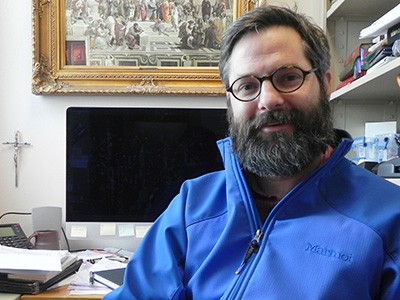USU Philosopher Connects with Students in Advocating a Broad Education
Harrison Kleiner, an assistant professor in the Department of Languages, Philosophy and Communication Study, has been named 2016 outstanding faculty member of the year by a statewide organization of professionals in higher-ed student affairs. The award recognizes Kleiner's influence and hard work in reshaping the university’s Connections course for freshmen.
“Why would I want to blossom when the world tells me all I need is STEM?”
Philosophy teacher Harrison Klein has fielded that question, oh, maybe a million times in his general education classes. Kleiner, an assistant professor in the Department of Languages, Philosophy and Communication Studies, understands it’s simply “a plea for meaning.”
Students show up at his general education classes, he says, after being “told by everyone, from their parents to their guidance counselors — even the president of the United States — that they go to college because it’s a straight line to a job.”
It’s true. Degrees in science, technology, engineering and math (STEM) are indeed getting all the attention. History and philosophy, not so much.
“It’s that whole thing,” he adds, “about engineers making more than philosophers.”
Kleiner still stings from a “potshot at the liberal arts” from Pres. Obama. In a 2014 speech, Obama remarked, “Folks can make a lot more, potentially, with skilled manufacturing or the trades than they might with an art history degree.”
But seeking a job rather than an education is something like the old adage about trees and forests, said Kleiner. “There’s been an excessive focus on the major and thinking your major is your destiny.”
And that, he adds, “is a really destructive narrative.”
Not surprisingly, general education courses create a lot of griping and frustration among students. More importantly, said Kleiner, the misunderstanding that general education wastes time has “negative repercussions on retention and student success.”
“It’s perfectly understandable that they show up to college and grouse about having to take courses outside their major,” he said. “It’s our job to explain why.”
With the help of Director of Student Orientation and Transition Services, Lisa Hancock, and other colleagues, Kleiner has sought to convey the concept of a broad education through Connections, the three-day freshman-orientation class occurring just before fall semester. The course has itself blossomed from being a list of student resources to valuable instruction on how to succeed in learning.
The optional, two-credit-hour class is the largest single course at USU, taken by about 60 percent of freshmen. It’s become so popular that its attendees fill nearly every classroom on campus. Kleiner sees it as a good opportunity to shape student expectations and values from the day they set foot on campus.”
Recently, Kleiner was recognized by the Utah chapter of Student Affairs Administrators in Higher Education as its 2016 Outstanding Faculty Member.
Partnerships between faculty and student affairs administrators are still rare, said Hancock, but they’re “very valuable.”
Kleiner, she said, has provided “countless hours” to improve the USU 1010 University Connections course, helping rewrite and simplify the objectives and refocus the curriculum.
Plus, as a philosophy professor, Kleiner is able to “help students understand why they are pursuing a college education,” said Hancock.
“He is fantastic at helping students realize the structure of a college degree, the value of general education and the importance of participating in cross-discipline and extra-curricular learning,” she said.
The Connections curriculum now focuses on what Kleiner describes as “the three big questions.” Those questions to new students are:
1. Why am I here? What is college, and how does all of this turn me into an educated person?
2. How do I succeed as a student? What skills do I need to be successful?
3. How do I become a member of the community? The university itself is a community of learners, said Kleiner. Data shows that if students also connect with other communities like clubs, “retention rates go way up.”
Now in its fourth year, the model is so unique that Kleiner and colleagues have presented the Connections curriculum at international conferences.
“What we’re doing here is really ahead of the curve,” said Kleiner, “in terms of getting student affairs and academics to work together to make orientation a meaningful experience that helps frame the value of a college education for students”.
Data from the now four-year-old program is showing that the results have been increased student retention, success and attitudes, said Hancock.
She adds, “As I interact with incoming students, it is easy for me to see the impact that his efforts have had on thousands of students. His willingness to give of his time is truly admirable and greatly appreciated.”
Writer and contact: Janelle Hyatt, Janelle.hyatt@usu.edu, 435-797-0289
Comments and questions regarding this article may be directed to the contact person listed on this page.






